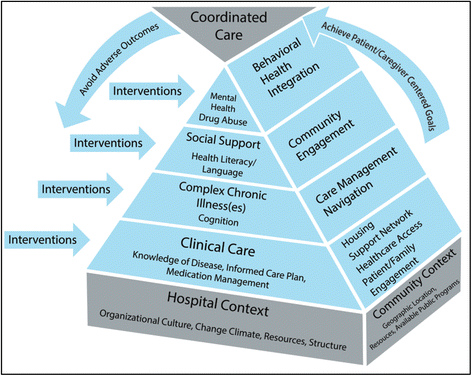Project ACHIEVE - using implementation research to guide the evaluation of transitional care effectiveness
- PMID: 26896024
- PMCID: PMC4759940
- DOI: 10.1186/s12913-016-1312-y
Project ACHIEVE - using implementation research to guide the evaluation of transitional care effectiveness
Erratum in
-
Erratum to: Project ACHIEVE - using implementation research to guide the evaluation of transitional care effectiveness.BMC Health Serv Res. 2016 Aug 1;16(1):326. doi: 10.1186/s12913-016-1560-x. BMC Health Serv Res. 2016. PMID: 27480756 Free PMC article. No abstract available.
Abstract
Background: Poorly managed hospital discharges and care transitions between health care facilities can cause poor outcomes for both patients and their caregivers. Unfortunately, the usual approach to health care delivery does not support continuity and coordination across the settings of hospital, doctors' offices, home or nursing homes. Though complex efforts with multiple components can improve patient outcomes and reduce 30-day readmissions, research has not identified which components are necessary. Also we do not know how delivery of core components may need to be adjusted based on patient, caregiver, setting or characteristics of the community, or how system redesign can be accelerated.
Methods/design: Project ACHIEVE focuses on diverse Medicare populations such as individuals with multiple chronic diseases, patients with low health literacy/numeracy and limited English proficiency, racial and ethnic minority groups, low-income groups, residents of rural areas, and individuals with disabilities. During the first phase, we will use focus groups to identify the transitional care outcomes and components that matter most to patients and caregivers to inform development and validation of assessment instruments. During the second phase, we will evaluate the comparative effectiveness of multi-component care transitions programs occurring across the U.S. Using a mixed-methods approach for this evaluation, we will study historical (retrospective) and current and future (prospective) groups of patients, caregivers and providers using site visits, surveys, and clinical and claims data. In this natural experiment observational study, we use a fractional factorial study design to specify comparators and estimate the individual and combined effects of key transitional care components.
Discussion: Our study will determine which evidence-based transitional care components and/or clusters most effectively produce patient and caregiver desired outcomes overall and among diverse patient and caregiver populations in different healthcare settings. Using the results, we will develop concrete, actionable recommendations regarding how best to implement these strategies. Finally, this work will provide tools for hospitals, community-based organizations, patients, caregivers, clinicians and other stakeholders to help them make informed decisions about which strategies are most effective and how best to implement them in their communities.
Trial registration: Registered as NCT02354482 on clinicaltrials.gov on 1/29/2015.
Figures
References
-
- Naylor MD, et al. Comprehensive discharge planning and home follow-up of hospitalized elders: a randomized clinical trial. JAMA. 1999;281(7):613–20. - PubMed
-
- Coleman EA, et al. The care transitions intervention: results of a randomized controlled trial. Arch Intern Med. 2006;166(17):1822–8. - PubMed
-
- Stauffer BD, et al. Effectiveness and cost of a transitional care program for heart failure: a prospective study with concurrent controls. Arch Intern Med. 2011;171(14):1238–43. - PubMed
-
- Voss R, et al. The care transitions intervention: translating from efficacy to effectiveness. Arch Intern Med. 2011;171(14):1232–7. - PubMed
Publication types
MeSH terms
Associated data
LinkOut - more resources
Full Text Sources
Other Literature Sources
Medical



